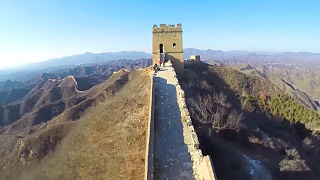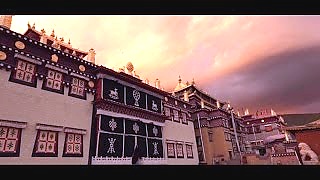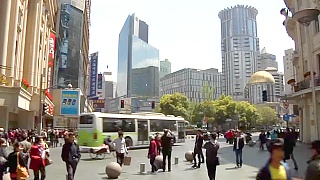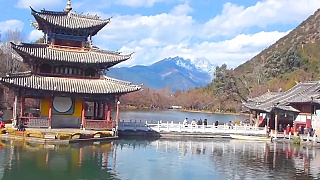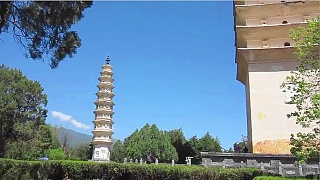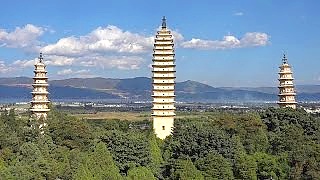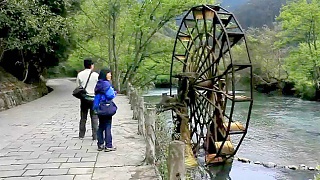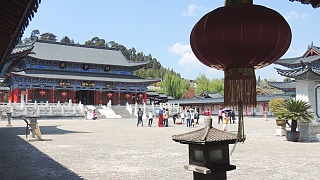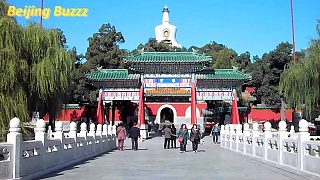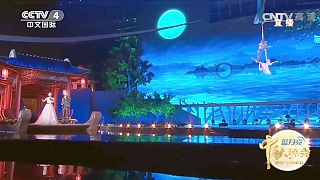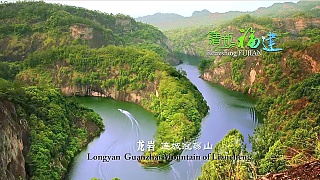Including DaLi 大力, LiJiang 丽江, Tiger Leaping Gorge 虎跳峡 and ChengDu 成都.
A great film - don't miss it ...
[640],shadow=true,start=48,stop=Chengdu, the capital of Sichuan Province in southwest China, is a vibrant city known for its rich history, spicy cuisine, and relaxed lifestyle. Here's a guide for tourists visiting Chengdu:
Cultural and Historical Attractions:
Chengdu Research Base of Giant Panda Breeding: One of the most popular attractions in Chengdu, this conservation center allows visitors to observe giant pandas in a semi-natural habitat.
Jinli Ancient Street: Located next to Wuhou Shrine, Jinli Ancient Street is a bustling pedestrian street lined with traditional Sichuan-style buildings, shops, teahouses, and street food stalls.
Wuhou Shrine: Dedicated to Zhuge Liang, a famous military strategist of the Three Kingdoms period, and Liu Bei, the emperor of the Shu Kingdom, Wuhou Shrine is a historic complex with beautiful gardens and ancient architecture.
Du Fu Thatched Cottage: This museum and park commemorates the Tang Dynasty poet Du Fu and features reconstructions of his former residence and gardens.
Culinary Delights:
Sichuan Cuisine: Chengdu is renowned for its spicy and flavorful Sichuan cuisine. Don't miss the opportunity to try local specialties like mapo tofu, hot pot, and dandan noodles.
Hot Pot: Chengdu's hot pot is famous nationwide. Enjoy a communal dining experience where you cook various meats, vegetables, and other ingredients in a bubbling pot of spicy broth.
Natural Beauty:
Mount Qingcheng: Located about an hour's drive from Chengdu, Mount Qingcheng is one of the birthplaces of Taoism and offers picturesque hiking trails, ancient temples, and serene scenery.
Jiuzhaigou Valley: While it's a bit further from Chengdu (requiring a flight or long bus ride), Jiuzhaigou Valley is a UNESCO World Heritage Site known for its stunning turquoise lakes, waterfalls, and colorful forests.
Modern Attractions:
Chengdu Research Base of Tianfu Giant Panda Breeding: In addition to the Giant Panda Breeding Base, this newer facility focuses on breeding and research for giant pandas and other endangered species.
Sichuan Opera: Experience traditional Sichuan opera performances featuring colorful costumes, face-changing (bian lian) techniques, acrobatics, and puppet shows.
Practical Tips:
Transportation: Chengdu has an efficient public transportation system, including a subway and buses. Taxis and ride-hailing services like DiDi are also readily available.
Weather: Chengdu has a humid subtropical climate with mild winters and hot, humid summers. It's advisable to check the weather forecast before your trip and pack accordingly.
Language: While Mandarin is the official language, the local dialect in Chengdu is Sichuanese. English may not be widely spoken outside of tourist areas, so consider learning a few basic phrases or carrying a translation app.
Chengdu offers a blend of cultural heritage, culinary delights, and natural beauty, making it an enticing destination for travelers seeking an authentic Chinese experience. Whether you're exploring historic sites, savoring spicy cuisine, or marveling at the region's natural wonders, Chengdu is sure to leave a lasting impression.
Dali, located in Yunnan Province in southwestern China, is a charming and culturally rich destination that attracts visitors with its stunning natural scenery, ancient history, and vibrant local culture. Here's a guide for visitors to Dali:
Historical and Cultural Significance:
Ancient City: Dali Ancient City, also known as Dali Old Town, is a well-preserved historical town that dates back over 1,000 years. It served as the capital of the Kingdom of Dali during the Tang Dynasty and later as an important trading post on the ancient Tea Horse Road.
Bai Minority Culture: Dali is home to the Bai ethnic minority, whose unique culture and traditions are evident throughout the region. Visitors can explore Bai villages, interact with locals, and learn about their traditional customs, architecture, and craftsmanship.
Top Attractions:
Erhai Lake: One of Dali's most iconic natural attractions is Erhai Lake, a vast freshwater lake surrounded by picturesque landscapes. Visitors can take boat cruises on the lake, cycle along its shores, or hike to viewpoints for panoramic views of the water and surrounding mountains.
Three Pagodas of Chongsheng Temple: Located just outside Dali Ancient City, the Three Pagodas are iconic symbols of the region and date back to the Tang Dynasty. The pagodas are set against the backdrop of Cangshan Mountain and are surrounded by lush gardens and temples.
Cangshan Mountain: Cangshan Mountain is a scenic mountain range that towers over Dali and offers numerous hiking trails, scenic viewpoints, and opportunities for outdoor adventure. Visitors can hike to waterfalls, explore alpine meadows, and enjoy panoramic views of the valley below.
Xizhou Ancient Town: Xizhou Ancient Town is another well-preserved historical town near Dali, known for its traditional Bai architecture, historic courtyards, and vibrant market streets. Visitors can wander through the town's narrow alleyways, visit ancient temples, and sample local delicacies.
Cultural Experiences:
Bai Architecture: Explore the distinctive Bai architecture found throughout Dali, characterized by white-washed walls, gray tiled roofs, and intricately carved wooden decorations. Visitors can tour traditional Bai homes, visit ancient temples, and learn about local building techniques.
Cultural Performances: Experience traditional Bai music, dance, and theater performances at local venues and cultural centers in Dali. These performances often showcase traditional costumes, musical instruments, and storytelling techniques unique to the Bai culture.
Practical Tips:
Weather: Dali enjoys a mild climate year-round, but the best time to visit is during the spring (March to May) and autumn (September to November) when the weather is most pleasant and the landscapes are lush and green.
Transportation: Getting around Dali is convenient with its network of buses, taxis, and bicycles. Many attractions are within walking distance of Dali Ancient City, while others can be reached by public transportation or organized tours.
Accommodation: Dali offers a range of accommodation options, including boutique hotels, guesthouses, and traditional courtyard homes. Staying in Dali Ancient City allows visitors to immerse themselves in the town's historic atmosphere and vibrant culture.
Dali offers a captivating blend of natural beauty, cultural heritage, and traditional charm, making it an enchanting destination for visitors seeking to explore the treasures of Yunnan Province. Whether hiking in the mountains, wandering through ancient towns, or immersing oneself in local culture, Dali has something to offer for every traveler.
Lijiang, located in the northwest of Yunnan Province in southwestern China, is a picturesque ancient town renowned for its stunning natural scenery, rich cultural heritage, and well-preserved traditional architecture. Here's a guide for tourists visiting Lijiang:
Historical and Cultural Significance:
Ancient Town: Lijiang Old Town, a UNESCO World Heritage site, is a well-preserved ancient town with a history dating back over 800 years. It was an important stop on the ancient Tea Horse Road, a trading route connecting Yunnan with Tibet and Southeast Asia.
Naxi Culture: Lijiang is home to the Naxi ethnic minority, whose rich cultural heritage is reflected in the town's architecture, music, and customs. Visitors can experience Naxi culture through traditional music performances, local festivals, and visits to Naxi villages.
Top Attractions:
Lijiang Old Town: Explore the cobblestone streets, winding alleys, and historic buildings of Lijiang Old Town, which is renowned for its traditional Naxi architecture, wooden houses, and flowing canals. Highlights include the ancient Mu Residence, Black Dragon Pool Park, and Sifang Street.
Jade Dragon Snow Mountain: Towering over Lijiang, Jade Dragon Snow Mountain is a majestic snow-capped mountain range known for its breathtaking scenery and diverse ecosystems. Visitors can take a cable car ride to the mountain's summit, hike along scenic trails, and enjoy panoramic views of the surrounding landscape.
Lijiang Mural: Baisha Village: Baisha Village, located near Lijiang, is home to a collection of ancient murals dating back to the Ming Dynasty. These exquisite frescoes depict scenes from Chinese mythology, religious rituals, and daily life, providing insights into the region's cultural heritage.
Tiger Leaping Gorge: Located about 60 kilometers north of Lijiang, Tiger Leaping Gorge is one of the deepest river canyons in the world and a popular destination for hiking and outdoor adventure. Visitors can trek along scenic trails, admire dramatic cliffs and waterfalls, and experience the natural beauty of the gorge.
Culinary Delights:
Yunnan Cuisine: Lijiang is known for its diverse and flavorful Yunnan cuisine, which features fresh ingredients, bold flavors, and influences from neighboring regions. Visitors can sample local specialties such as Yunnan hot pot, crossing-the-bridge noodles, and yak meat dishes at restaurants and street food stalls throughout the town.
Old Town Snacks: Explore the bustling markets and food stalls of Lijiang Old Town to discover a wide variety of snacks and delicacies, including fried cheese, sweet pastries, and rice cakes. Don't miss the opportunity to try local specialties like yak butter tea and rose-flavored desserts.
Practical Tips:
Weather: Lijiang enjoys a mild climate year-round, with cool summers and chilly winters. The best time to visit is during the spring (March to May) and autumn (September to November) when the weather is pleasant and the scenery is beautiful.
Altitude: Lijiang is situated at a high altitude, so visitors should take precautions to prevent altitude sickness, such as staying hydrated, avoiding strenuous activity, and acclimatizing gradually.
Transportation: Getting around Lijiang is convenient with its network of public buses, taxis, and bicycles. Many attractions in and around the town can be explored on foot or by bicycle, while taxis and buses provide transportation to more distant locations.
Accommodation: Lijiang offers a wide range of accommodation options, including boutique hotels, guesthouses, and traditional courtyard homes. Staying in Lijiang Old Town allows visitors to immerse themselves in the town's historic atmosphere and vibrant culture.
Lijiang offers a captivating blend of natural beauty, cultural heritage, and traditional charm, making it an enchanting destination for tourists seeking to explore the treasures of Yunnan Province. Whether marveling at ancient architecture, hiking through majestic mountains, or savoring local cuisine, Lijiang has something to offer for every traveler.

 Exploring beautiful YunNan 云南 province
Exploring beautiful YunNan 云南 province
